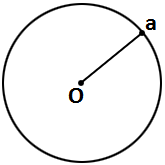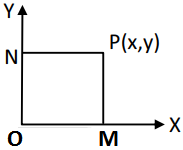Locus – Algorithm
Definition of Locus: In geometry, a locus is a set of all points (commonly, a line, a line segment, a curve or a surface), whose location satisfies or is determined by one or more specified conditions.

Equation to the Locus of a Point: The equation to the locus of a point is the relation which is satisfied by the coordinates of every point on the locus of the point.
Algorithm to find the Locus of a Point:
i. Assume the coordinates of the point (h, k) whose locus to be found.
ii. Write the given condition in mathematical form involving h, k
iii. Eliminate the variables if any
iv. Replace h by x and k by y in the result (3).
Example: Find the equation of locus of a point which is equidistance from the coordinate’s axes.
Solution: Let P(x, y) be any point in the locus.

Let PM = perpendicular distance of P from X- axis. = |x|.
let PN = perpendicular distance of P from Y – axis = |y|.
Given condition PM = PN
|x| = |y|
Squaring on both sides
x² = y²
∴ Locus of P is x² – y² = 0.
